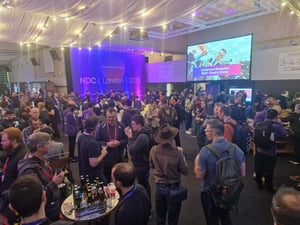
Eye-share at NDC London 2025
At the tail end of January, eye-share sent a delegation of 10 developers to NDC London 2025, a seasoned conference of high quality where you can learn about the latest tools, methods and controversial technologies such as AI.
What a wonderful time spent at a Conference filled to the brim with competent and interesting developers. Forging stronger connections between colleagues and internal departments, fetching inspiration and insights from the biggest of the big with Microsoft, as well as exploring the smallest C# Program in the world with Steve Gordon. – Magnus King, Technical Solution Consultant at Eye-share.
Keynote on AI
Scott Hanselman started the conference off with a banger of a keynote diving straight into that AI topic. It was quite refreshing to hear a message of tempering our expectation of how much AI can currently do for us. By showing how much LLM generated text can vary at any given token, Hanselman emphasized that LLMs are very fancy and impressive autocomplete engines, but that they are still just a form of autocomplete. Consequently, we must be very critical in how we use chat bots and other tools based on this technology. By using AI as a sparring partner and interrogating it we can get a lot of useful help from it. But uncritically taking its first output as truth is a big mistake.
The AI focus
For some of us, like Daniel, the keynote set the stage for most thought-provoking theme.
“During NDC London, there was a lot of focus on AI, reflecting both the public's growing interest and the dev community's active engagement with AI technologies. The general public perceives AI with a mix of curiosity and caution, intrigued by its potential to transform industries but also concerned about ethical implications and job displacement. This dual perception was clearly shown in discussions and presentations throughout the conference.
For developers like me, AI tools were highlighted as powerful assets to enhance product development and streamline internal workflows. Sessions demonstrated how AI can be integrated into software solutions to provide smarter, more efficient user experiences. Additionally, we were encouraged to use AI for automating repetitive tasks, improving code quality, and accelerating testing processes, ultimately leading to more innovative and robust products.
This focus on AI at NDC London shows the expectation that it will shape the future of technology, urging developers to embrace AI tools to stay competitive and meet evolving user needs.” - Daniel Andre Aviles Herlufsen, Technical Solution Consultant.
Thinking like an architect
For others a few sessions on more organizational and structural matters caught our attention.
“The conference reinforced that we're doing many things right in software development while also highlighting areas for improvement. My favorite talk, 'Thinking Like an Architect,' emphasized making others smarter by sharing decision models, uncovering blind spots, and bridging organizational layers through models and metaphors.” – Espen Jakobsen, Senior Developer.
“I totally agree. I think I’ll buy Gregor Hohpe’s book ‘The Architect Elevator’. He had so many great points! As architects we should absolutely be the elevator which connects and helps translate across various levels of the business. We can zoom out and see things from more angles, to find the simplest possible model for a given question. And in doing so the solution should seem obvious! His finance allegory that what we do as architects is ‘selling options’ was well made. We provide options for locking down certain things and opening up for change in other things, and the field of Finance tells us that these options are valuable in a volatile field such as software development.” – Gaute Løken, Lead Software Architect at Eye-share.
Glorious monoliths
The initial hype surrounding the idea of microservice architectures is dying down and a more levelheaded discussion on how we can take the best parts of such systems and incorporate them in a more pragmatic way in event driven monolithic systems were discussed across three excellent sessions:
- ‘Practical advice for building glorious monoliths’ by Glenn F. Henriksen
- ‘Consistency and Agreements in Distributed Systems’ by Jimmy Bogard
- ‘Navigating complexity in event-driven architectures: A domain-driven approach’ by David Boyne
A central theme was how we can gain the benefit of low coupling through events without paying the high cost of distributed transactions.
“These sessions really gave me a lot to consider. Is the way we’re flowing our domain objects through our layers actually bad, or is it convenient? Certainly, we have too high coupling between our modules. I would love to have the time to fix some of that by introducing more events and dependency rules!
I also picked up a small concept given by Glenn which I’ll definitely use: Writing code in such a way that you ensure developer consumers end up in the ‘Pit of success’, doing the right thing, is a great concept. Of course we do this, but I haven’t had a name for it until now.” – Gaute Løken
You’re doing exceptions wrong
“I found the scoring system of giving green, yellow, and red notes after each talk to be a simple yet genius way of giving a review. Its only misstep was in the talk ‘You're Doing Exceptions Wrong’ as there physically weren't enough green notes ready. A catchy title combined with a theme that all developers deal with almost every single day meant a huge share of attendees paid close attention.
‘We all use them all over our codebases, but no one is ever taught how to do them.’ So how should you do them? In the talk, we were presented with some different types of exceptions and a general approach to each:
- Fatal exceptions => Throw
- Boneheaded exceptions => Throw + rewrite so it cannot happen
- Vexing exceptions => Try to rewrite; otherwise, catch and handle
- Exogenous exceptions => Catch and handle
This is an extreme oversimplification of reality and should be studied in more detail to get a more complete picture. The idea of the need for embracing some exceptions is something I haven't really considered too much. I believe this line of thought will change my approach to how I see exception handling. I also really liked the simple demo showing that trying to catch errors can cause significant harm. Even when you were trying to help your code along by try/catching, you could end up creating indistinguishable scenarios that make debugging them that much harder. I really recommend watching this talk if this sounds remotely interesting and you deal with exceptions by writing them, finding them, causing them, or trying to catch them.
Sometimes it's okay to not be like Ash Ketchum, as you actually don't have to catch them all.” – Håvard Landråk, Technical Solution Consultant.
The conference
As an experienced conference organizer NDC events are well attended both in terms of speakers and audience. The exhibition and networking areas are buzzling with activity, especially between sessions, with relevant stands offering fun challenges and raffles, food stations, baristas and a lot of likeminded attendees. With 5-6 parallel tracks of 5-6 sessions per day that’s a large quantity of sessions and you’d think quality has to suffer. But no. These conferences are very popular, and the organizer is very good at filtering their call-for-paper submissions resulting in both high volume and excellent quality.
“I can’t believe I ended up giving green feedback to all but one single session!” – Gaute Løken
Team building
Going on a conference like this isn’t only valuable in terms of inspiration and knowledge, but it also acts as team building.
“While NDC was packed with insightful talks, the real bonding happened outside the conference halls. Every evening, our team headed out to explore London’s food scene over dinner and a few beers, discussing the day's sessions and unwinding together. After the conference ended, six of us stayed for the weekend, making the most of our time in the city. We caught a Championship match (Millwall-QPR), went shopping, visited a museum, battled it out on arcade machines, and continued our food and beer tour of London. The trip wasn’t just about learning—it was about shared experiences, great conversations, and making memories as a team.” – Torbjørn Ankerheim.
Thanks, NDC Conferences, and until next time! 💖
Would you like to be part of our R&D-team?
We’re looking for five experienced software developers to join our team in Stavanger and help us build the future of automation. Learn more about the position here.
.jpg?width=300&name=20250129_124006%20(1).jpg)
Subscribe to our Communications







